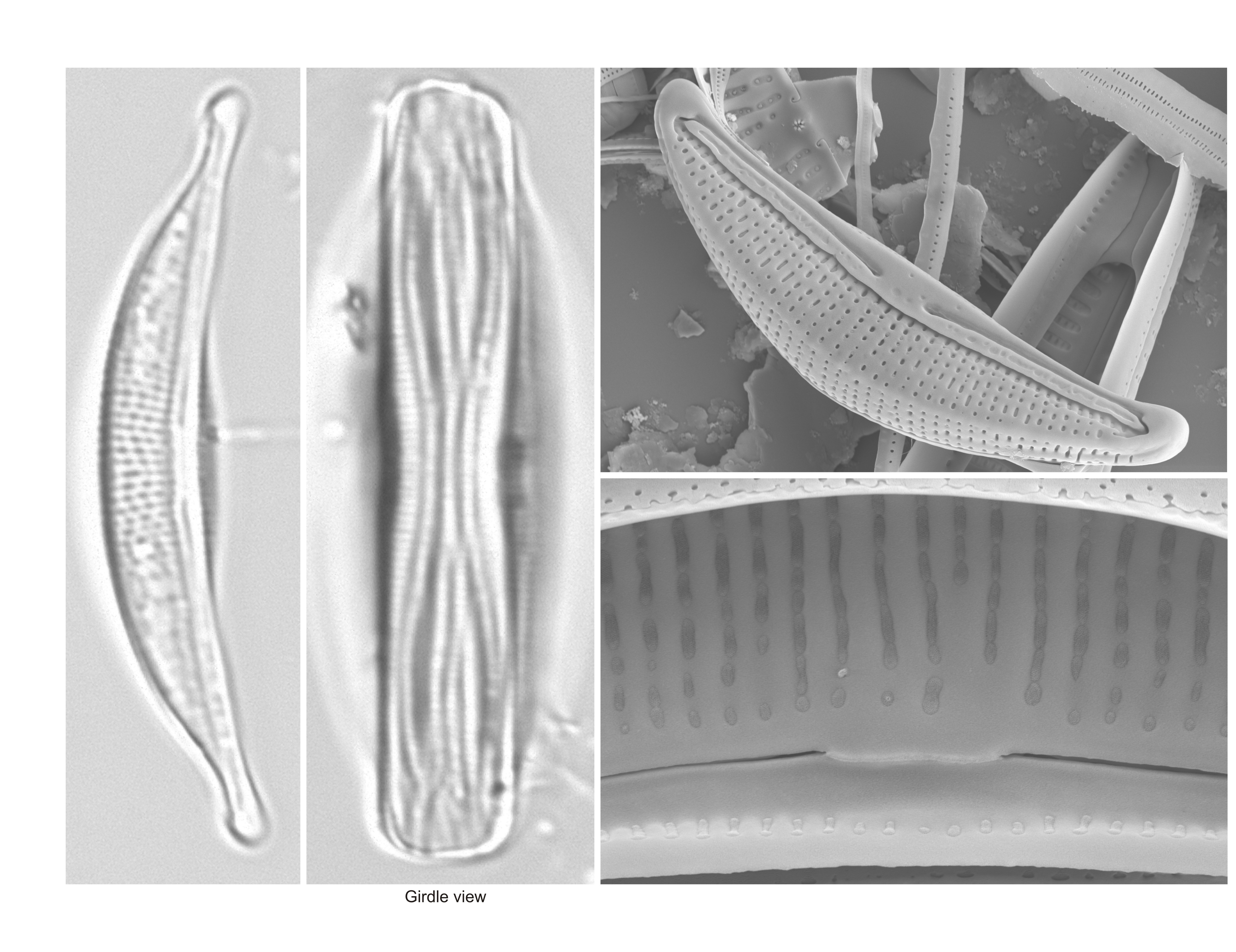Halamphora (Cleve) Levkov; 2009; 165
Key references
Morphology
Frustules highly dorsiventral (‘amphoroid’), compressed, so that cells almost always lie in girdle view, when they appear as truncated ellipses but often with their ends more or less rectangular. Isolated valves have a straight or slightly concave ventral margin and a convex dorsal margin and may be rostrate.
Frustules isovalvar, isopolar, bilaterally strongly asymmetrical; girdle wide.
Striae uniseriate or biseriate, parallel, fine, often poorly developed (each comprising only one or a few areolae) on the ventral side; areolae small, circular, occluded by fine pore plates (hymenes). Unusually for diatoms, the stria density frequently (but not always) differs on the two sides of the valve, those on the ventral side being more closely spaced.
Axial area narrow, may extend out over the striae externally as a narrow flap (conopeum). Central area may be scarcely differentiated from the axial area on the dorsal side, or slightly expanded.
Raphe straight or curved; external central raphe endings straight or deflected towards the dorsal side, expanded; internal central raphe endings connected by a narrow ridge; terminal fissures bent towards the dorsal side.
Girdle composed of several to many narrow bands.
A single H-shaped chloroplast lies against the ventral side of the cell.
Frustules isovalvar, isopolar, bilaterally strongly asymmetrical; girdle wide.
Striae uniseriate or biseriate, parallel, fine, often poorly developed (each comprising only one or a few areolae) on the ventral side; areolae small, circular, occluded by fine pore plates (hymenes). Unusually for diatoms, the stria density frequently (but not always) differs on the two sides of the valve, those on the ventral side being more closely spaced.
Axial area narrow, may extend out over the striae externally as a narrow flap (conopeum). Central area may be scarcely differentiated from the axial area on the dorsal side, or slightly expanded.
Raphe straight or curved; external central raphe endings straight or deflected towards the dorsal side, expanded; internal central raphe endings connected by a narrow ridge; terminal fissures bent towards the dorsal side.
Girdle composed of several to many narrow bands.
A single H-shaped chloroplast lies against the ventral side of the cell.
Literature
References are given in chronological order.
Reference |
Citation |
|---|---|
| Wachnicka A.H., Gaiser E.E. 2007. Characterization of Amphora and Seminavis from South Floria, U.S.A. Diatom Research. 22(2): 387-455. | Morphology; Ecology; Illustrations |
| Levkov Z. 2009. Amphora sensu lato. Lange-Bertalot H. (ed.) Diatoms of Europe: Diatoms of the European Inland Waters and Comparable Habitats. Vol. 5., A.R.G. Gantner Verlag K.G., Ruggell. 916 pp | Morphology; Ecology; Description |
| Stepanek J.G., Kociolek J. P. 2013. Several new species of Amphora and Halamphora from the western USA. Diatom Research. 28(1): 61-76. |
This page should be cited as:
Mann D. G. Halamphora (Cleve) Levkov; 2009; 165. In: Jüttner I., Carter C., Cox E.J., Ector L., Jones V., Kelly M.G., Kennedy B., Mann D.G., Turner J. A., Van de Vijver B., Wetzel C.E., Williams D.M..
Freshwater Diatom Flora of Britain and Ireland. Amgueddfa Cymru - National Museum Wales. Available online at https://naturalhistory.museumwales.ac.uk/diatoms/browsespecies.php?-recid=3627. [Accessed:
].
Record last modified: 27/12/2020


